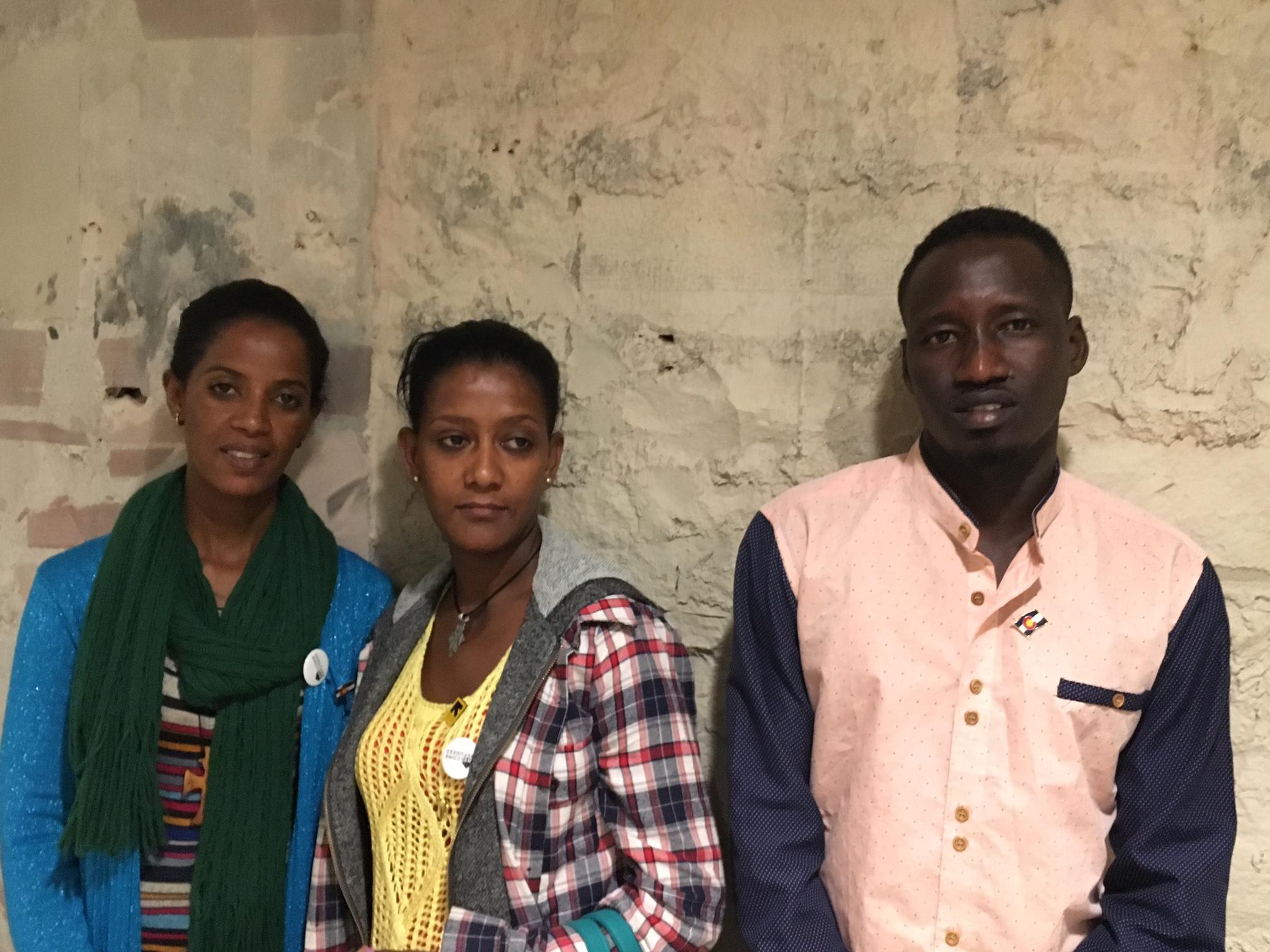Bisrat Misgna arrived in Colorado a week and a half ago after spending four years in a refugee camp on the border between Ethiopia and her native Eritrea. She's pregnant, but her husband is still in the refugee camp. He started his application process at a different time than she did, and she doesn't know when he might join her. Her siblings are also still in the refugee camp. She has no close family in Colorado.
"This is her family," interpreter Daniel Woldu said of Nanu Tunga, another Eritrean refugee who arrived with her and is her roommate.
Speaking through Woldu, Tunga said Colorado has been extremely welcoming, but she has lingering fears because of "the situation" with U.S. policies.
Colorado Gov. John Hickenlooper and Denver Mayor Michael Hancock were speaking as much to "the situation" as they were to the people in the room at a refugee welcome event Wednesday at Union Station.
"Looking out today, I don't see a risk to our way of life, a threat, a danger," Hickenlooper said. "I see neighbors, friends, colleagues."

Hickenlooper said this moment in American history represents a test of our shared values.
"People don't choose to be refugees. They don't choose to leave the only country they have ever known. They don't choose to be torn from their homes by civil war or violence or persecution. In almost every case, what they desire more than anything else is some measure of security for themselves and their families."
Then he pivoted to talk about vetting and travel bans. Some of the people in the room would not have been there if President Donald Trump's travel ban hadn't been stayed by a federal appeals court.
"They have navigated through the world's most stringent vetting system," Hickenlooper said. "That process should be as stringent as possible. We want to make sure we're in no way compromising (our security). But even as stringent as it may be, we don't want to have religious tests and blanket bans that compromise the basic values this country was built on. Those kinds of tests really damage our international reputation and, I think it's fair to say, make us less safe at home and abroad."
Hickenlooper quoted at length from Emma Lazarus' poem "The New Colossus," written to raise money for the Statue of Liberty.
From her beacon-hand
Glows world-wide welcome; her mild eyes command
The air-bridged harbor that twin cities frame.
"Keep ancient lands, your storied pomp!" cries she
With silent lips. "Give me your tired, your poor,
Your huddled masses yearning to breathe free,
The wretched refuse of your teeming shore.
Send these, the homeless, tempest-tost to me,
I lift my lamp beside the golden door!"
"Today America is still the home of the beacon hand, the sunset gate and the golden door," he said.
Hancock similarly mixed his welcome of the refugees with criticism of Trump and thoughts on border security.
"We know that you don't want to have to live in fear and limited hope. That's why you came to this country," he said. "We want to do everything we can to reassure you the doors of opportunity will remain open for those who want to be productive and care for their families and contribute to the overall quality of life of our country."
"What is happening in Washington really calls for us to beckon the very best of who we are," he continued. "Those of us elected or not are really being called to summon the moral courage to speak up when we see things that are not right. I'm going to be very clear in my disposition that the policies addressing immigration and refugees in this country coming out of the White House today are wrong. They have resulted in chaos and confusion and fear in our communities."
Also: "We can strengthen our borders, which we should do. We don't have to build a wall, which is not a very wise idea. We can use technology and surveillance and equipment with 21st century tools to make sure we strengthen our borders. It doesn't have to be either-or."
Colorado had expected to settle 2,195 refugees this year, a slight increase from previous years. Trump's executive order could cut that number in half, according to the Colorado Department of Human Services. When the executive order was signed, 693 refugees who had waited years for resettlement had their arrivals canceled. Only about a third of them have made it since the order was put on hold.
The crowd at Union Station was full of children playing with toys from gift baskets as their parents listened. The newly arrived refugees -- from Eritrea and Yemen, Somalia and Syria, the Democratic Republic of the Congo and Iraq -- seemed suddenly more focused as Farduus Ahmed took the stage.
Ahmed described fleeing terrible violence in Somalia when she was just 15 and spending years in a refugee camp before coming to Colorado in 2014. Her first job was at Walmart. Now she is an office administrator and community navigator with the Colorado African Organization, where she helps other refugees find their footing in this new land.
She said seeing elected officials stand up for refugees made her very proud to live in Colorado.
"I had mixed emotions when I arrived. I was so scared because I was alone and in a new place," she said. "I also knew I had gone through many challenges, and I knew this couldn't be as hard as what I had gone through before. I was determined to use my strength in all the situations that came to me.
"That's the thing, right? That's the thing. You can do it in America. And we are in a state that believes in us."










